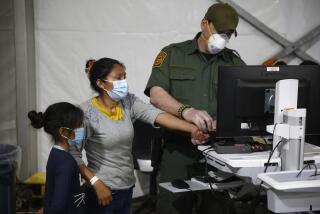U.S. Eases Stand in Chemical Arms Talks : Diplomacy: ‘Anywhere, any time’ inspections of suspected gas plants is no longer the goal.
- Share via
WASHINGTON — The Bush Administration, attempting to make sure that enforcement of a proposed international ban on chemical weapons will not compromise unrelated military secrets, has backed away from its longtime support for “anywhere, any time” inspections.
The United States has proposed an alternative plan that would allow delays and impose restrictions on inspections of suspected chemical-weapons production and storage facilities, a change critics say could permit some clandestine poison-gas projects to avoid detection.
An Administration official said the new proposal, introduced July 15 at a 39-nation disarmament conference in Geneva, would “balance the requirements of national security for non-chemical-weapons-related matters with the requirements of a chemical-weapons ban.”
The official said the change would prevent countries from “fishing” for secrets, such as Stealth aircraft technology, by filing bogus charges that chemical weapons are being stored on sites where non-gas research is being conducted. But he maintained that a treaty containing the U.S.-backed inspection plan still would prevent any country from developing gases for warfare.
Critics of the proposal said it would open a treaty loophole large enough to permit other Third World countries to copy Iraq’s clandestine chemical-weapons development efforts. Chemical arms, which are relatively cheap and easy to produce, are considered within the reach of many nations that lack the financial and scientific resources to develop nuclear arms.
The U.S. proposal was co-sponsored by Britain, Australia and Japan, despite some earlier misgivings on their part about relaxing the inspection requirements. China and most Third World countries are calling for even more permissive rules. France and Canada, supported by most developed countries, have led the opposition to the change. The proposed treaty is being negotiated under the auspices of the United Nations.
President Bush, then vice president, made a dramatic speech to the disarmament conference in 1984, calling for an end to the scourge of chemical warfare. At the time, he demanded enforcement provisions that would allow inspections “anywhere, any time, and no right of refusal.”
“Now, the same President is arguing that we can’t have intrusive inspections for chemical weapons and storage areas,” said Elisa D. Harris, a senior research analyst at the Brookings Institution in Washington. “This is the most dramatic event since the chemical-weapons negotiations began. What we are losing is the opportunity to have access to sites in Third World countries where we have evidence about possible violations.
“We have some very strange bedfellows in this,” she said.
The Administration official said the proposed rules still would permit any country to accuse any other country of illegal activities at any time. But the extent of any subsequent inspection would be the subject of negotiations.
Under the U.S. plan, the official said, a country accusing another of making or possessing chemical weapons would be required to keep its challenge “relevant to the treaty.” The challenged state would be required to provide maximum access to inspectors, and the inspectors would be required “to do their work in the least intrusive way that will satisfy the treaty.”
Disagreements over the application of those rules would be subject to negotiation among the parties.
Disarmament negotiators have been wrestling with a ban on chemical weapons for decades. However, both Administration officials and non-government experts said chances are good that a treaty will be completed late this year or early next year.
More to Read
Sign up for Essential California
The most important California stories and recommendations in your inbox every morning.
You may occasionally receive promotional content from the Los Angeles Times.










